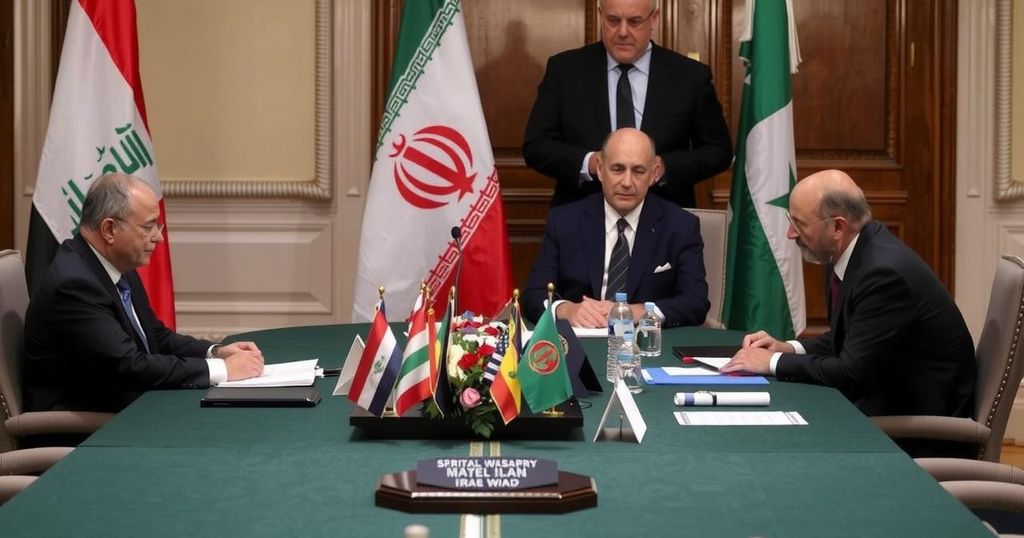Global news
ABBAS ARAGHCHI, ARAGHCHI, ASIA, ASSAD, BASS, BASSAM AL - SABBAGH, CIVILIAN CASUALTIES, CONFLICT, EUROPE/ASIA, FU, FUAD HUSSEIN, HAMA, HAYAT TAHRIR AL - SHAM, HEZBOLLAH, HOMS, IRAN, KHAMIS AL - KHANJAR, MIDDLE EAST, MIDDLE EAST AFFAIRS, MINISTRY, MU, MUQTADA AL - SADR, RUSSIA, SAD, SADR, SHIA, SOVEREIGNTY ALLIANCE, SYRIA, TERRORISM
Isaac Bennett
0 Comments
Iraq, Iran, and Syria Convene Emergency Talks Amidst Rebel Gains in Homs
Iranian Foreign Minister Abbas Araghchi’s arrival in Baghdad highlighted a crisis meeting with Iraq and Syria’s foreign ministers regarding escalating rebel offensives in Syria, with regional leaders expressing concerns over stability. As opposition forces, particularly HTS, gain territory, voices within Iraq call for non-interference, while others emphasize the necessity of vigilance against external threats.
On Friday morning, Iranian Foreign Minister Abbas Araghchi arrived in Baghdad to participate in a tri-nation meeting with his Iraqi and Syrian counterparts, aimed at addressing the recent developments in Syria where rebel forces have made significant territorial gains. Araghchi was set to meet with Iraqi Foreign Minister Fuad Hussein and Syrian Foreign Minister Bassam Al-Sabbagh during a private discussion, after which an official joint statement from Baghdad and Tehran regarding the crisis was expected.
The offensive launched by Syrian rebel factions, particularly the Islamist Hayat Tahrir al-Sham (HTS), commenced just over a week ago, resulting in notable defeats for the regime forces and the loss of critical areas, including the strategically important city of Hama. Iraqi Foreign Minister Fuad Hussein expressed deep concern regarding the implications of these events on regional security and stability, acknowledging the unexpected momentum gained by opposition forces.
An official from the Iraqi foreign ministry, who chose to remain anonymous, expressed skepticism about the meeting’s potential to influence the situation, stating that it may be too late to alter the dynamics favorably for the Syrian regime. After the rebels took control of Hama, regime forces referred to their tactical withdrawals and indicated preparations for a counter-offensive.
In Iraq, various crucial voices are stressing the importance of refraining from interference in Syrian affairs and withdrawing any Iraqi combatants supporting the Syrian government. Khamis Al-Khanjar, the leader of the Sovereignty Alliance, voiced concerns regarding the repercussions of such interventions, calling for the withdrawal of armed factions from Syria. This sentiment was echoed by prominent Shia cleric Muqtada Al-Sadr, who urged Iraqi authorities and citizens alike to respect the Syrian populace’s right to self-determination.
In contrast, Falih al-Fayyadh, the head of the Popular Mobilisation Forces (PMF), maintained that Iraq must remain vigilant in response to the situation in Syria, framing the conflict as part of broader foreign agendas and Western involvement. He emphasized Iraq’s interlinked security concerns, asserting that Syria’s instability directly affects Iraq’s security interests.
The article delves into the urgent diplomatic meeting among the foreign ministers of Iraq, Iran, and Syria, highlighting the tense situation in Syria where a significant offensive by rebel forces threatens the stability of the region. This situation arises amid a backdrop of shifting power dynamics within Syria, where government forces have recently faced unexpected setbacks against the opposition, raising considerable concern among neighboring states. The diverse perspectives within Iraq regarding intervention reflect the complexity of the geopolitical landscape influencing both domestic and foreign policy decisions.
In summary, the emergency meeting between Iraq, Iran, and Syria reflects significant regional tensions as rebel forces gain momentum in Syria. The contrasting views within Iraq regarding intervention highlight the delicate balance of power and the complexity of the ongoing crisis. While some leaders advocate for non-involvement, others warn of the potential consequences of allowing foreign influence in neighboring Syria, highlighting the intertwined security concerns of these nations.
Original Source: www.newarab.com




Post Comment